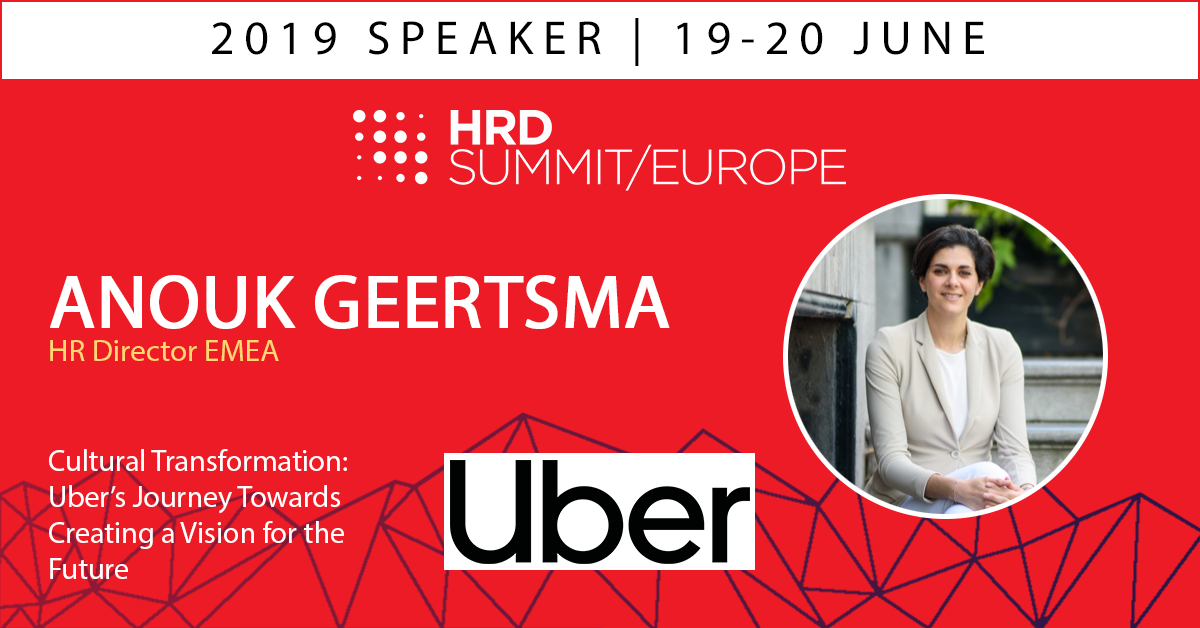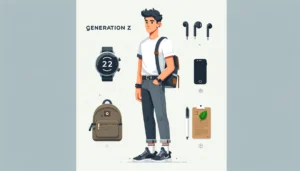Uber's journey to a new internal culture: Anouk Geertsma, HR Director EMEA, Uber
- 6 Min Read
Ahead of her appearance at the HRD Summit EU at the RAI Amsterdam, June 19th-20th, Anouk Geertsma spoke to HRD Connect about the hard times of the past for Uber, and the brighter future ahead.
- Author: Michael Hocking
- Date published: Apr 25, 2019
- Categories

How does an organisation reset its internal culture to zero, and build it back up to one-hundred?
Uber’s journey has been one unlike any other in recent memory. Growing from strength to strength as a truly disruptive platform that revolutionised the way we travel, Uber’s path of success met with difficulty when their culture was criticised in the media for being male-centric and aggressive.
It was time for change. Anouk Geertsma, HR Director EMEA, Uber, has taken on Uber’s internal culture with the task of transforming it for the better.
Ahead of her appearance at the HRD Summit EU at the RAI Amsterdam, June 19th-20th, Anouk Geertsma spoke to HRD Connect about the hard times of the past for Uber, and the brighter future ahead.
What has Uber learned from the difficult times the company faced 2 years ago, and how is it resetting its internal culture to foster positive change?
We have come a long way since the challenges we faced in 2017 and have worked hard to reform our culture from the ground up and the top down. Our ultimate goal is to make Uber the best place to work, where everyone feels safe, respected and inspired. One of the first things we did after Dara joined as CEO in 2017 was to develop eight new cultural norms that define who we are, what we stand for, and how we work. These norms came from the bottom up, not the top down, and are lead by the idea that we do the right thing, period.
How can businesses with large, mobile workforces create a supportive and engaged employee experience?
We are working very hard to create an environment where all employees feel supported and engaged. Two years ago, the company was in hyper-growth mode with many incredibly passionate and hardworking people, but there was a hunger to create a more inclusive culture that enables everyone to thrive and succeed. Transforming a workplace doesn’t happen overnight.
We need to invest for both the short and long term, and change has to happen at both a personal and an institutional level. Much of the work we did in 2018 was laying the foundation for more to come. We published our second annual D&I Report, sharing demographic information about our workforce and our commitment to increase representation of women and underrepresented groups. In EMEA, we launched a sponsorship program for our emerging female talent pool to enable and accelerate their development at Uber. We also built a more inclusive recruiting process for our senior level roles, whereby our sourcing team spends two weeks sourcing and engaging with female talent to build a strong and diverse pipeline and we do not hire a candidate until we have seen a minimum of one female candidate at the final stage of the recruitment process.
These actions, combined with having diverse interview panels across all roles, have ensured that we hired men and women at parity across our senior roles in EMEA during the second half of 2018. It’s a good start but we need to do more, particularly at the leadership level. This is an issue I think everyone in the tech industry can and should do better on.
How does Uber attract and retain talent?
People are attracted to Uber for its mission and its impact on the cities and communities we serve. As we continue to grow and expand into new areas, including food delivery, new mobilities with bikes and e-scooters but also logistics with Freight, we have many new and exciting ways to differentiate! This said, we also work hard to create a great work environment as well as to provide exciting career opportunities. Uber does a lot to encourage internal mobility and development within the company. In 2018 alone, over 3000 employees transferred to a different role, a third of whom went into a totally different job function. 350 of those employees moved internationally. We also look at competitive compensation packages. In the past two years, we’ve done extensive compensation benchmarking and adjusted salaries to ensure they are competitive with the market. We also established a program that awards equity (RSUs) on an annual basis to retain our talent and give them a stake in Uber’s growth.
What’s next for Uber, and how will business innovation concur with cultural transformation in its future?
Change takes time. Rebuilding trust takes time. But I’m confident we are on the right path and are progressively earning back our reputation internally and externally. Uber isn’t perfect and we never will be. Our cultural norm of doing the right thing isn’t about pretending to be perfect, it’s a process of striving to be better. In that vein, our work to have a better culture and be a better company isn’t supposed to have an ending point, it should be something we are all working on every day.
As a platform, Uber partners with millions of drivers and couriers around the world. But isn’t there an inherent problem surrounding wellbeing in the gig economy?
Work provides a path to economic security and social mobility. However, work is changing, and more people are accessing work through online platforms like Uber. In fact, more than 3 million people around the world choose to use Uber to work and earn in a way that fits around their life. We want to play our part to improve the quality of work across the board and think there are several key areas for focus.
First, we want to help solve for the needs of workers in the 21st century by offering flexibility and security through innovative products and partnerships that ensure that no one slips through the social safety net. We have made important investments globally through our Partner Protection program where we provide a range of insurance coverage including sickness, injury and maternity & paternity payments for drivers and couriers across many of the markets in which we operate when they are on and off the Uber app.
We are also working to create tools to enable progress and social mobility through education, experience and lifelong learning. In the US, we have partnered with a local university to offer drivers or their families access to flexible education with 100% tuition coverage. And this is just a beginning. Drivers and couriers are at the heart of Uber experience. We deeply care about being a good partner to them and will continue to work hard to ensure better work quality for all.








